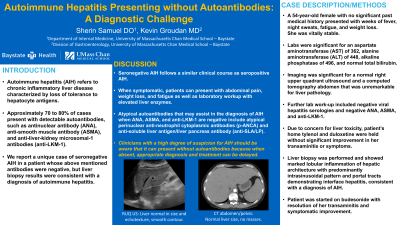Back


Poster Session E - Tuesday Afternoon
Category: Liver
E0564 - Autoimmune Hepatitis Presenting Without Autoantibodies: A Diagnostic Challenge
Tuesday, October 25, 2022
3:00 PM – 5:00 PM ET
Location: Crown Ballroom

Has Audio

Sherin Samuel, DO
UMass Chan Medical School - Baystate
Springfield, MA
Presenting Author(s)
Sherin Samuel, DO1, Kevin Groudan, MD2
1UMass Chan Medical School - Baystate, Springfield, MA; 2University of Massachusetts Medical School - Baystate, Springfield, MA
Introduction: Autoimmune hepatitis (AIH) refers to chronic inflammatory liver disease characterized by loss of tolerance to hepatocyte antigens. Approximately 70 to 80% of cases present with detectable autoantibodies, such as antinuclear antibody (ANA), anti-smooth muscle antibody (ASMA), and anti-liver-kidney microsomal-1 antibodies (anti-LKM-1). We report a unique case of seronegative AIH in a patient whose above mentioned antibodies were negative, but liver biopsy results were consistent with a diagnosis of AIH.
Case Description/Methods: A 54-year-old female with no significant past medical history presented with weeks of fever, night sweats, fatigue, and weight loss. She was vitally stable. Labs were significant for an aspartate aminotransferase (AST) of 362, alanine aminotransferase (ALT) of 448, alkaline phosphatase of 496, and normal total bilirubin. Imaging was significant for a normal right upper quadrant ultrasound and a computed tomography abdomen that was unremarkable for liver pathology. Further lab work-up included negative viral hepatitis serologies and negative ANA, ASMA, and anti-LKM-1. Due to concern for liver toxicity, patient’s home tylenol and duloxetine were held without significant improvement in her transaminitis or symptoms. Liver biopsy was performed and showed marked lobular inflammation of hepatic architecture with predominantly intrasinusoidal pattern and portal tracts demonstrating interface hepatitis, consistent with a diagnosis of AIH. Patient was started on budesonide with resolution of her transaminitis and symptomatic improvement.
Discussion: Seronegative AIH follows a similar clinical course as seropositive AIH. When symptomatic, patients can present with abdominal pain, weight loss, and fatigue as well as laboratory workup with elevated liver enzymes. Atypical autoantibodies that may assist in the diagnosis of AIH when ANA, ASMA, and anti-LKM-1 are negative include atypical perinuclear anti-neutrophil cytoplasmic antibodies (p-ANCA) and anti-soluble liver antigen/liver pancreas antibody (anti-SLA/LP). Clinicians with a high degree of suspicion for AIH should be aware that it can present without autoantibodies because when absent, appropriate diagnosis and treatment can be delayed.
Disclosures:
Sherin Samuel, DO1, Kevin Groudan, MD2. E0564 - Autoimmune Hepatitis Presenting Without Autoantibodies: A Diagnostic Challenge, ACG 2022 Annual Scientific Meeting Abstracts. Charlotte, NC: American College of Gastroenterology.
1UMass Chan Medical School - Baystate, Springfield, MA; 2University of Massachusetts Medical School - Baystate, Springfield, MA
Introduction: Autoimmune hepatitis (AIH) refers to chronic inflammatory liver disease characterized by loss of tolerance to hepatocyte antigens. Approximately 70 to 80% of cases present with detectable autoantibodies, such as antinuclear antibody (ANA), anti-smooth muscle antibody (ASMA), and anti-liver-kidney microsomal-1 antibodies (anti-LKM-1). We report a unique case of seronegative AIH in a patient whose above mentioned antibodies were negative, but liver biopsy results were consistent with a diagnosis of AIH.
Case Description/Methods: A 54-year-old female with no significant past medical history presented with weeks of fever, night sweats, fatigue, and weight loss. She was vitally stable. Labs were significant for an aspartate aminotransferase (AST) of 362, alanine aminotransferase (ALT) of 448, alkaline phosphatase of 496, and normal total bilirubin. Imaging was significant for a normal right upper quadrant ultrasound and a computed tomography abdomen that was unremarkable for liver pathology. Further lab work-up included negative viral hepatitis serologies and negative ANA, ASMA, and anti-LKM-1. Due to concern for liver toxicity, patient’s home tylenol and duloxetine were held without significant improvement in her transaminitis or symptoms. Liver biopsy was performed and showed marked lobular inflammation of hepatic architecture with predominantly intrasinusoidal pattern and portal tracts demonstrating interface hepatitis, consistent with a diagnosis of AIH. Patient was started on budesonide with resolution of her transaminitis and symptomatic improvement.
Discussion: Seronegative AIH follows a similar clinical course as seropositive AIH. When symptomatic, patients can present with abdominal pain, weight loss, and fatigue as well as laboratory workup with elevated liver enzymes. Atypical autoantibodies that may assist in the diagnosis of AIH when ANA, ASMA, and anti-LKM-1 are negative include atypical perinuclear anti-neutrophil cytoplasmic antibodies (p-ANCA) and anti-soluble liver antigen/liver pancreas antibody (anti-SLA/LP). Clinicians with a high degree of suspicion for AIH should be aware that it can present without autoantibodies because when absent, appropriate diagnosis and treatment can be delayed.
Disclosures:
Sherin Samuel indicated no relevant financial relationships.
Kevin Groudan indicated no relevant financial relationships.
Sherin Samuel, DO1, Kevin Groudan, MD2. E0564 - Autoimmune Hepatitis Presenting Without Autoantibodies: A Diagnostic Challenge, ACG 2022 Annual Scientific Meeting Abstracts. Charlotte, NC: American College of Gastroenterology.

